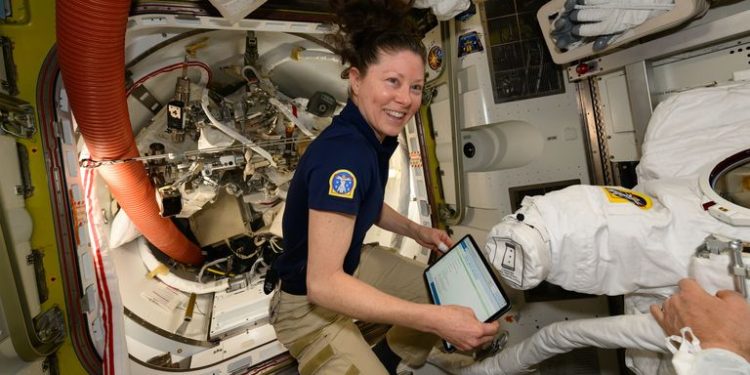Two astronauts are set to exit the International Space Station (ISS) later on a mission to gather living organisms growing on the facility.
NASA astronauts Tracy Dyson and Matt Dominick attempted the operation on 13 May but had to abort it due to “suit discomfort”.
Mr Dominick will be replaced for Monday’s walk by Mike Barratt.
During the six and a half hour operation, they will swab surfaces on two pieces of equipment to determine if microorganisms can survive the extreme environment.
So why are astronauts gathering tiny space organisms… and how did they get there?
Microorganisms have been living on the outside of the space station since it blasted off in 1998.
“When the space station was launched, it was inside space shuttles,” said Dr Carly Howett who works on NASA missions exploring the solar system and at the University of Oxford.
“They’re not necessarily pristine environments, so [the microorganisms] could have just hitched a ride on the way up, no problem at all.”
The organisms could have also been released from the space station over the years, according to Dr Howett.
“When we do a [space walk], there’s an airlock. We lose some of the air from inside the space station.
“Perhaps some of that air also carries with it some of these organisms.”
“Studying them should reveal a lot about life in space, as well as helping us make sure we don’t contaminate other planets as we explore the solar system and beyond.
“One of the really interesting things as we go out to explore the outer solar system is [the question], ‘Is there life?’
“To know whether there’s life out there, you have to go to places where you think life might exist. And to do that, you’ve got to make sure you’re not bringing life with you.”
“Whether we go to Jupiter’s moons and look under the surface, whether we fly through the plumes of Saturn’s moons, wherever we go, we want to make sure that we’re detecting brand-new life and not the life that tagged along on the outside of our spacecraft.”
Because the International Space Station is comparatively accessible, Dr Howett described it as “low-hanging fruit” in the hunt to discover more about these space microbes.
“It’s in the cold darkness of space, it gets a heat cycle as it goes into sunlight and out of sunlight, so it has gone through these very difficult thermal environments.
“If life is still clinging on and surviving on the outside, it tells us a lot about the kind of environments [microbes] will be able to survive in as we move to the outer solar system.
“It’s right there for the picking. All you’ve got to do is go outside and scrape it and then we can investigate it in our labs.”
“You throw us into space, we die”
Organisms that can survive in extreme environments like space or the deep ocean are called extremophiles and Dr Howett says they can teach us about a different way of experiencing life.
“You go down to the deepest part of the oceans where there’s no sunlight,” she said.
“You would expect everything to be dead [but] we’ve seen time and time again, these little things that look like teddy bears [that] survive in incredible circumstances.
“The microbes become dormant in these extreme environments, frozen solid. Once they get heated up again, they can come back to life.
“It’s very different to the way that we experience life; you throw us into space, we die.
“Understanding the extent of how long they can be dormant for, how they can survive this thermal cycling is something we don’t know well enough.
“[That’s] why doing experiments like this is really important.”
This isn’t the first time these organisms have been studied. For nearly two decades, Russia’s cosmonauts collected the microbes clinging to the outside walls of the ISS.
They found microorganisms not only survive in the extreme environment but retain their reproductive ability as well, according to NASA.
They also found the microorganisms they collected from space became more resistant to antibiotics.
This new study by NASA, that Ms Dyson and Mr Dominick are collecting for, aims to explore whether the ISS releases microorganisms and, if so, how many and how far they may travel.









